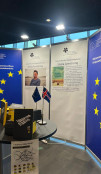Ambassadors of EU Member States Visit Grindavík

Ambassadors and representatives of EU Member States accredited to Iceland visited Grindavík on Thursday 20 March 2025. The President of the Grindavík Town Council, Ms. Ásrún Helga Kristinsdóttir, and the Chair of the Special Committee on the Affairs of Grindavík, Mr. Árni Þór Sigurðsson, gave an overview of the current state of play in the Grindavík area and discuss the current and future challenges facing the town. They provided information about the many emergency measures undertaken in the town to protect the town, homes, businesses and critical infrastructure since the devestating Sundhnúkagíga eruptions began in October 2023.
The Ambassadors travelled around Grindavík and the surrounding area in order to witness the emergy measures for instance the construction of large defensive barriers around the town, as well as emergency repairs to critical infrastructure to maintain water and electricity generation in the area under the guidance of Mr. Jón Haukur Steingrímsson, geotechnical engineer.
The Ambassadors also visited local businesses and discussed with staff members about security and evacuation plans. Although the town has remained more or less empty of residents after the evacuations conducted in November 2023, more than 800 people travel to and work in the town when safe - many of whom are EU citizens. Large numbers of European tourists also visit the Blue Lagoon, which also remains operational behind defensive barriers when deemed safe.
Iceland and the EU have a strong partnership when it comes to civil protection. The EU Civil Protection Mechsnism is ready to respond to Icelandic emergency requests, as it did in 2023 when the EUCPM dispatched a group of specialists to assist authorities in emergency planning ahead of the Sundhnúkagíga-eruptions. Icelandic Civil Protection also relies on important data provided by the European Union's Copernicus Programme. The Copernicus satellites provide accurate, real-time data and satellite imagery to monitor seizmic and volcanic activity in the area which supports emergency planning before and during natural disasters.
The Reykjanes Peninsula is a volcanically active area which had not seen an eruption for roughly 800 years when a series of eruptions started in March 2021 at Fagradalsfjall. In November 2023 a series of highly dangerous eruptions started at Sundhnúkagígar which have had a devastating affect on the town of Grindavík. Defensive barriers were put in place and the town was evacuated. When safe, only around 40-50 homes are occupied by residents, whereas more than 800 workers keep vital businesses operational.




